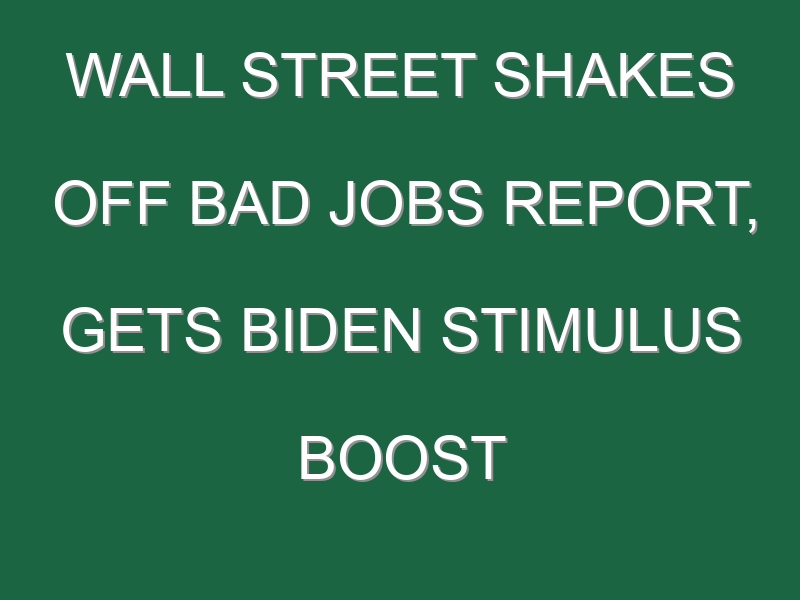Good evening, Bull Sheeters. This is Fortune finance reporter Rey Mashayekhi, filling in for Bernhard with a special PM edition of the newsletter.
It’s been a long, eventful week, to say the least—but an altogether good one for markets globally, which head into the weekend on a mostly positive note. Let’s get into the day’s developments:
Markets update
U.S.
- After climbing early and then trading in the red in the early afternoon session, Wall Street’s major indexes all ended the day on new record-high closes. The Dow picked up 0.2%, the S&P 500 gained 0.6%, and the Nasdaq rose 1%.
- The market initially shook off a bad December jobs report that showed the U.S. economy lost 140,000 jobs last month amid an escalating pandemic that continues to devastate leisure and hospitality businesses.
- But stocks pulled back in the early afternoon after West Virginia Senator Joe Manchin, one of the more conservative Democrats in the Senate, appeared to pour cold water on the robust stimulus measures that Dems are widely expected to pursue now that they control both chambers of Congress.
- Manchin later backtracked on that stance, while President-elect Joe Biden outlined plans for a massive stimulus package that was music to the ears of investors—as evidenced by the market’s late-afternoon rally.
- The prospect of higher government spending is hitting long-term Treasury prices, however, with yields spiking in the wake of Democrats’ double-victory in the Georgia Senate runoff elections.
- Deutsche Bank once again finds itself paying a hefty price for its misconduct. The German lender has agreed to a $130 million settlement with U.S. authorities to resolve a bribery investigation concerning its foreign dealings, as well as a commodities trading probe.
Europe
- The European bourses capped off a banner week with gains across the board. London’s FTSE ticked up 0.2%, Frankfurt’s DAX gained 0.6%, and both the CAC 40 in Paris and the pan-European STOXX 600 climbed 0.7%.
- It was a tough day for big European banks’ balance sheets. Credit Suisse is forecasting a fourth-quarter loss after it set aside $850 million to settle financial crisis-era legal disputes, while Commerzbank’s new CEO announced a $1.8 billion goodwill write-off.
- U.K. antitrust regulators are investigating Google over privacy-related changes made to the tech giant’s Chrome web browser.
- Europe’s largest parcel delivery service, DPDgroup, is pausing U.K.-to-EU road shipments due to Brexit-related paperwork complications.
- Norway’s plan to triple its national tax on carbon dioxide emissions has drawn the ire of the nation’s oil lobby.
Asia
- Tokyo’s Nikkei continued on its tear, breaking 28,000 for the first time since August 1990 with a 2.4% gain Friday. Hong Kong’s Hang Seng picked up 1.2%, and South Korea’s KOSPI capped off an excellent start to 2021 by surging another 4%. On mainland China, the major indexes in Shanghai and Shenzhen each notched down -0.2%.
- The fallout continues from the Trump administration’s maneuvers against Chinese companies. Three major index providers—MSCI, FTSE Russell, and S&P Dow Jones—said they would delist three Chinese telecom firms from their benchmarks, following a similar move by the New York Stock Exchange. That prompted a major selloff of those firms’ shares in Hong Kong—though Chinese investors are already seeing an opportunity for bargains, should the Biden administration reverse course on companies blacklisted by Trump.
- Additionally, off-exchange trading platform operator OTC Markets said it will prohibit the trading of 12 Chinese securities as a result of the Trump administration’s sanctions.
- South Korean carmaker Hyundai said it is in talks with tech giant Apple on a partnership believed to be focused on autonomous electric vehicles—though Hyundai quickly backtracked and may even have jeopardized the deal by spilling the beans.
- South Korea’s IPO market is bracing for a record year, with analysts expecting more than $18 billion raised over the course of 2021. Likewise, Thailand’s stock exchange is aiming to boost its market capitalization by more than $16 billion through IPOs and secondary listings.
Elsewhere
- Gold sagged as investors felt safe enough to retreat from safe havens.
- The dollar notched up.
- Bitcoin broke $41,000 Friday before pulling back below that mark.
- Crude oil prices climbed, with Brent trading at $56/barrel.
***
By the numbers
It’s Friday, and I’m never one to mess with tradition, so let’s have a look at some numbers:
28,139.03
That was the Nikkei’s closing value on Friday—the first time that the Tokyo Stock Exchange benchmark index has closed above 28,000 points since August 15, 1990. For context on how long it’s taken the TSE to recover the losses sustained after Japan’s asset bubble burst in the early ‘90s, your correspondent was but a three-month-old bundle of joy the last time the Nikkei traded at these levels.
9.7%
Speaking of Asian bull markets, that’s how much South Korea’s KOSPI index has gained since its final close of 2020, with South Korean stocks going gangbusters to start the new year.
498,000
That’s the number of jobs lost across the U.S. leisure and hospitality sector in December, as a spike in COVID-19 cases nationwide forced businesses to close their doors and lay off employees. Bars and restaurants bore the brunt of the pain, having accounted for 372,000 of those job losses.
$42,000
That’s the base price of Tesla’s new Model Y SUV, which the electric automaker unveiled on Thursday evening. The vehicle—Tesla’s lowest-priced midsize SUV to date—is part of an effort by the company to produce more affordable cars.
***
That’s all from me this week; you’ll be back in Bernhard’s hands on Monday. Until then, please be sure to check out today’s reads below, and have a lovely weekend.
Rey Mashayekhi
@ReyM12
[email protected]
As always, you can write to [email protected] or reply to this email with suggestions and feedback.




